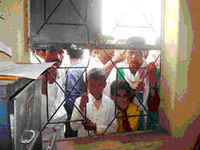Yemen: Selling food aid to pay the rent
Some of the thousands of internally displaced persons (IDPs) who have fled fighting in Saada Governorate, northern Yemen, are selling food aid in the capital, Sanaa, to pay their rent, say an aid worker and some IDPs.
"We are selling beans and baby biscuits we get from aid agencies to pay the rent. Where are we supposed to find YR 20,000 [US$95] a month to pay rent when we no longer have livelihoods?" asked Ahmad Atif, a 68-year-old IDP from Saada's Razeh District, now in the capital, Sanaa.
Atif appealed to aid organizations to help them pay their rent in Sanaa, which does not have any IDP camps, or provide tents for people to live in.
Clashes between government forces and Houthi-led insurgents in the north have prompted ever more IDPs to flock to Sanaa in search of safety and assistance, Marie Marullaz, an external relations officer with the UN Refugee Agency (UNHCR), told IRIN.
Lack of adequate shelter was of “serious concern” to UNHCR, said Marullaz, but efforts to provide shelter and other aid were being hampered by “an almost complete lack of funds".
Some 11,800 out of an estimated 15,000 IDPs living in Sanaa had been registered by UNHCR since the latest flare-up in fighting in August 2009, she said.
IDPs living with host families are less and less able to cope, she said. "Most IDPs are renting or say they are having difficulty finding accommodation due to rent rises. Many families are thus having to share overcrowded accommodation."
No money
When they arrived in the city, they had some funds from the sale - at low prices - of livestock, but now they are running out of money, Mohammed al-Farih, a teacher from Saada's Razih District who helps aid workers register IDPs in Sanaa, told IRIN.
Al-Farih said many IDPs in rented apartments would be unable to keep up the payments without help. "Dozens of families are selling food aid to get money to pay rent. They risk being thrown out in a few days’ time if they are unable to pay," he said.
Al-Farih estimated that 60 percent of IDPs in Sanaa are children, placing a considerable burden on family heads.
Thousands of IDPs previously with host families have begun searching for less overcrowded accommodation, amid reports of as many as 100 people sharing a five-room house, Saeed al-Kamil, an aid worker from the local NGO Islah Charitable Society, told IRIN.
"As aid workers, we can report the most vulnerable cases of people selling food aid to pay rent to our management, and see whether they can help," he said. "However, lack of funding remains a major concern."
UNHCR's Marullaz said more and more families were getting into debt.
A shelter assessment team has been deployed in Sanaa, as well as in Hajjah and Amran governorates to work on different shelter solutions, Marullaz said. "The assessments should be completed in the coming weeks and will serve as a basis for UNHCR’s shelter strategy."


